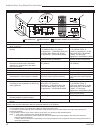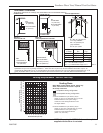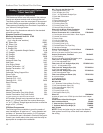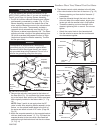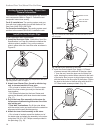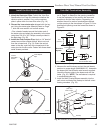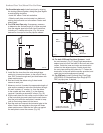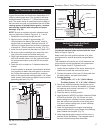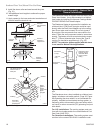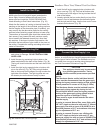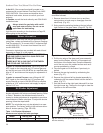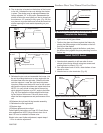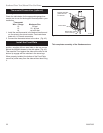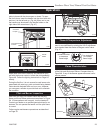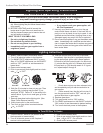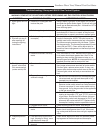
18
Stardance Direct Vent/Natural Vent Gas Heater
20007065
9. Install the storm collar and seal around the joints.
(Fig. 31)
10. Add additional vent lengths to achieve the proper
overall height.
11. Apply cement to the inner and outer termination col-
lars and install the terminal cap.
ST222
vent thru ceiling
12/99
#7DVAIS
Attic Insulation
Shield
#7DVFS
Firestop in
Upper Floor
#7DVFS
Firestop in
Ceiling
Use Four
8dNails
ST222
Fig. 30 Install firestops and attic insulation shield.
ST221
vent thru roof
12/99
Sealant
Storm Collar
Use three #5 sheet
metal screws at
each joint
Upper
edge of
flange
goes under
upper
shingles
Flashing
#7DVSKV
(A, B, or F)
RoofSupport
ST221
Fig. 31 Roof support and flashing.
Venting System Assembly - Natural Vent
General Information
The Stardance Heater is shipped from the factory as a
Direct Vent Heater. It may be converted to a Natural
Vent heater by installing the Vermont Castings Model
Z31D00 FSDHAG Draft Hood Adapter.
The Stardance Heater is approved for installation as
a Natural Vent. CFM Direct Vent pipe could be used
directly after the Draft Hood Adapter up to the ceiling,
then B-vent pipe must be used. Do not mix types of
B-vent pipe; use components from one maker or the
other. Follow the vent component maker’s instructions
exactly. The heater will also accept standard or enam-
elled 7” (178mm) diameter pipe, around the Type B
venting, for decorative purposes only. (Fig. 32)
NOTE: The restrictor plate supplied with the stove
is not used for Natural Vent applications.
ST358
Decorative
pipe around b-vent
4/26/00 djt
CFM Direct Vent
System may be
used after Draft
Hood up to the
ceiling
Decorative
7” Pipe
4” B-vent
Pipe
Draft Hood
Adapter
ST358
Fig. 32 Decorative 7” pipe may be fitted around the B-vent
pipe.
The Stardance stove, when installed as a Natural vent
heater, includes a vent safety switch. (Page 36, Figure
66) Operating the stove when it is not connected to a
properly installed and maintained venting system, or
tampering with or disconnecting the vent safety switch,
can result in carbon monoxide (CO) poisoning and pos-
sible death.
For U.S. installations: The venting system must con-
form with local codes and/or the current National Fuel
Gas Code, ANSI Z22.1.
For Canadian installations: The venting system must
conform to the current CSA B149.1 installation code.



